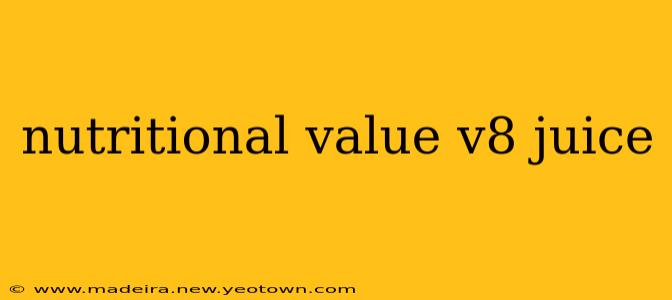V8 juice. The name conjures images of vibrant vegetables, a refreshing drink, and maybe even a healthy boost. But is it really all it's cracked up to be? Let's dive into the nutritional value of V8 juice, separating fact from fiction and exploring what this popular beverage offers (and perhaps, what it lacks).
My journey into understanding V8 juice began with a simple question: Is it as healthy as it claims to be? The answer, like most things in nutrition, is complex. It’s not a simple yes or no.
What are the main ingredients in V8 juice?
V8 juice's primary claim to fame is its blend of vegetables. But the exact mix can vary depending on the specific V8 product. Typically, you'll find a combination of tomato juice, carrot juice, and various other vegetables like celery, lettuce, and beet juice. These contribute a variety of vitamins, minerals, and antioxidants. However, it's crucial to examine the specific nutritional information on the packaging of the particular V8 juice you're considering.
What are the nutritional benefits of V8 juice?
Let's talk about the good stuff. V8 juice is a reasonably good source of several essential nutrients. It contains vitamins A and C, both vital for immune function and overall health. It also offers potassium, important for maintaining healthy blood pressure, and some beneficial antioxidants like lycopene (from tomatoes), which has been linked to reduced cancer risk. Many varieties also boast a decent amount of vitamin K, beneficial for blood clotting and bone health.
It's important to remember that the nutritional content can fluctuate based on the specific blend and any added ingredients.
How many calories are in V8 juice?
The calorie count varies depending on the type of V8 juice. While it's lower in calories compared to many fruit juices, it's not calorie-free. A typical serving might contain anywhere from 40 to 80 calories. The added sugar content can also vary widely, so it's always best to check the nutritional label.
Is V8 juice good for weight loss?
While V8 juice can contribute to a balanced diet, it's not a miracle weight-loss solution. The calories, even if relatively low, still add up. Moreover, the liquid nature of juice doesn't provide the same satiety as eating whole vegetables. To support weight loss, focusing on whole, unprocessed vegetables should remain a priority. V8 can be a part of a weight-loss strategy but shouldn't be relied upon as the sole solution.
Does V8 juice have high sugar content?
This is a crucial point. Many V8 juice varieties contain added sugar, and this can quickly negate some of the potential health benefits. Always opt for varieties that are 100% juice with no added sugars. Check the label carefully – you'll often find this information clearly stated.
Is V8 juice better than eating whole vegetables?
This is where the conversation gets interesting. While V8 juice provides some of the nutrients found in vegetables, it significantly lacks the fiber found in whole vegetables. Fiber is essential for digestive health, and it plays a vital role in promoting satiety and helping to regulate blood sugar levels. Eating whole vegetables provides a much more comprehensive range of nutrients and fiber than even the healthiest vegetable juice. Think of V8 as a supplement, not a replacement for whole vegetables.
Conclusion: A Balanced Perspective
V8 juice can be a convenient way to incorporate some vegetables into your diet, especially for those who struggle to eat enough. It provides some vitamins and minerals. However, it's vital to remember that it shouldn't replace whole vegetables, which offer a far more comprehensive nutritional profile, including crucial fiber. Always check the nutritional label, be mindful of added sugars, and treat V8 juice as a supplement, not a primary source of your daily vegetable intake. The best way to reap the benefits of vegetables is through incorporating a wide variety of them into your meals in their whole, unprocessed forms.

